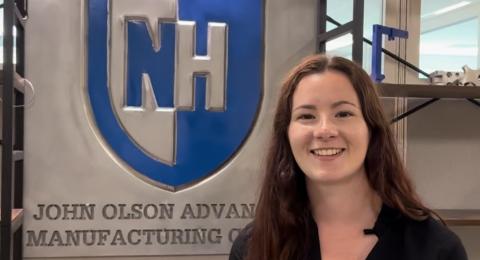The Mechanical Engineering major at UNH dives into the core principles of mechanics, materials, and systems design, equipping yourself with the skills to innovate across industries in today’s ever-evolving world. Here, you can gain hands-on experience at the John Olson Advanced Manufacturing Center, join an array of engineering design competition teams and secure internships with renown engineering companies that open doors to a spectrum of career paths including aerospace, manufacturing, power generation, robotics and more.
What is a Bachelor of Science in mechanical engineering?
This program is tailored to students who want to pursue a professional career in industry or advanced studies in engineering. Students develop abilities in design, analysis and experimentation through a foundation of math, physics, chemistry and computer science, before moving to more advanced engineering topics that include mechanical design, control systems and energy generation/conversion. This program also gives students the chance to focus on advanced technical areas of their choice. As professionals in the field, our graduates solve a wide range of interdisciplinary engineering problems and societal grand challenges.
Why study mechanical engineering at UNH?
You’ll analyze, design, build, test and maintain the tools and products of our growing technological society, working in state-of-the-art laboratories such as the John Olson Advanced Manufacturing Center, the Jere A. Chase Ocean Engineering Lab and the Flow Physics Facility, which houses the longest wind tunnel of its type in the world. Our faculty are leading researchers in their fields, and they care deeply about your education. The curriculum is challenging but flexible, providing opportunities for you to participate in research, internships, co-ops and capstone projects that will prepare you for a variety of in-demand careers.
Potential Careers
- Aerospace
- Automotive industries
- Biomedical engineering
- Manufacturing/industrial engineering
- Ocean engineering
- Power generation
- Robotics
Curriculum & Requirements
The B.S.M.E. curriculum provides students with a solid engineering core and prepares students for professional engineering careers or for graduate study. The department has course sequences in mechanics, thermal/fluid sciences, and systems and controls. Modern experimental methods are taught in a course sequences starting in the junior year. The two-semester senior design project requires students to utilize the skills they have learned in their courses and function in an engineering team. The five technical electives required in the program give the students the opportunity to focus on advanced technical areas of their choice.
With their advisers' assistance, students should plan a program based on the following distribution of courses that totals not less than 128 credits. Note: mechanical engineering graduates typically exceed this requirement depending on what elective courses they select in the curriculum. Within the constraints of satisfying all the requirements and having all the necessary prerequisites, schedules may vary because of scheduling needs or student preference. Curriculum flexibility allows students to pursue a co-op experience or a minor, if interested which will potentially delay graduation. Some mechanical engineering elective courses may not be offered every year.
The Mechanical Engineering (B Sci in Mechanical Engineering) program is accredited by the Engineering Accreditation Commission of ABET, https://www.abet.org, under the General Criteria and the Program Criteria for Mechanical and Similarly Named Engineering Programs.
Sample Degree Plan
This sample degree plan serves as a general guide; students collaborate with their academic advisor to develop a personalized degree plan to meet their academic goals and program requirements.
| First Year | ||
|---|---|---|
| Fall | Credits | |
| ME 441 or ME 477 | Introduction to Engineering Design and Solid Modeling 1 or Introduction to Solid Modeling | 4 |
| CHEM 405 | Chemical Principles for Engineers 2 | 4 |
| OR | ||
CHEM 403 & CHEM 404 | General Chemistry I and General Chemistry II 2 | |
| MATH 425 | Calculus I 3 | 4 |
| Discovery Program Elective | 4 | |
| Credits | 16 | |
| Spring | ||
| ENGL 401 | First-Year Writing 4 | 4 |
| MATH 426 | Calculus II | 4 |
| PHYS 407 | General Physics I 2 | 4 |
| Discovery Program Elective | 4 | |
| Credits | 16 | |
| Second Year | ||
| Fall | ||
| ME 525 | Statics | 4 |
| IAM 550 | Introduction to Engineering Computing | 4 |
| MATH 528 or MATH 525 | Multidimensional Calculus 5 or Linearity I | 4 |
| PHYS 408 | General Physics II | 4 |
| Discovery Program Elective | 4 | |
| Credits | 20 | |
| Spring | ||
| ME 503 | Thermodynamics | 3 |
| ME 526 | Mechanics of Materials | 3 |
| ME 561 | Introduction to Materials Science | 4 |
| MATH 527 or MATH 526 | Differential Equations with Linear Algebra 5 or Linearity II | 4 |
| Credits | 14 | |
| Third Year | ||
| Fall | ||
| ME 608 | Fluid Dynamics | 3 |
| ME 627 | Dynamics | 3 |
| ME 705 | Thermal System Analysis and Design | 4 |
| ECE 537 | Introduction to Electrical Engineering | 4 |
| Discovery Program Elective | 4 | |
| Credits | 18 | |
| Spring | ||
| ME 603 | Heat Transfer | 3 |
| ME 643 | Machine Design | 3 |
| ME 646 | Experimental Measurement and Data Analysis | 4 |
| ME 670 | Systems Modeling, Simulation, and Control | 4 |
| Credits | 14 | |
| Fourth Year | ||
| Fall | ||
| ME 755 or TECH 797 | Senior Design Project I 6 or Undergraduate Ocean Research Project | 2 |
| ME 747 | Experimental Measurement and Modeling of Complex Systems | 4 |
| Technical Elective | 3-4 | |
| Technical Elective | 3-4 | |
| Discovery Program Elective | 4 | |
| Credits | 16-18 | |
| Spring | ||
| ME 756 or TECH 797 | Senior Design Project II 6 or Undergraduate Ocean Research Project | 2 |
| Technical Elective | 3-4 | |
| Technical Elective | 3-4 | |
| Technical Elective | 3-4 | |
| Discovery Program Elective | 4 | |
| Credits | 15-18 | |
| Total Credits | 129-134 | |
- 1
ME 441 Introduction to Engineering Design and Solid Modeling satisfies the Discovery Inquiry requirement. Note: ME 477 does not satisfy the Discovery Inquiry requirement. An alternative Discovery Program Inquiry course or Inquiry Attributes course is required. Permission is required to take ME 477 in place of ME 441.
- 2
CHEM 405 Chemical Principles for Engineers or CHEM 403 General Chemistry I and CHEM 404 General Chemistry II, or PHYS 407 General Physics I satisfies the Discovery Physical Science (with lab) category.
- 3
MATH 425 Calculus I satisfies the Discovery Foundation Quantitative Reasoning category.
- 4
ENGL 401 First-Year Writing satisfies the Discovery Foundation Writing Skills category.
- 5
MATH 525 Linearity I and MATH 526 Linearity II also counts as a 600 level technical elective course typically completed in the senior year of the program. Permission is required to take Linearity I and II.
- 6
ME 755, ME 756 and TECH 797 satisfy the Discovery Senior Capstone Experience category.
Degree Requirements
All Major, Option and Elective Requirements as indicated.
*Major GPA requirements as indicated.
Major Requirements
Grade-Point Average Requirements
In order to graduate with a mechanical engineering B.S. degree, students must have at least a 2.0 grade-point average in all engineering and science courses, including required technical electives, normally taken as department requirements after the start of the junior year as defined in the degree plan below.
Predictor courses: To enter the sophomore year, students must achieve a greater than (but not equal to) 2.00 GPA in PHYS 407 General Physics I and MATH 426 Calculus II with no grade below a C.
To enter the junior year, students must achieve a minimum GPA of 2.00 in ME 525 Statics, ME 526 Mechanics of Materials, and ME 503 Thermodynamics with only one C- grade allowed and no grades below C-.
Students are allowed two repeats of these predictor courses to achieve the predictor rule requirements before being removed from the Program. This can be a single class repeated twice or two classes repeated once. Students are also removed from the program if if they obtain a semester GPA below 1.5 three times. Students may petition to be reinstated after one year out of the program.
| Code | Title | Credits |
|---|---|---|
| Required Courses | ||
| CHEM 405 | Chemical Principles for Engineers | 0-8 |
| or CHEM 403 & CHEM 404 | General Chemistry I and General Chemistry II | |
| ECON 402 | Principles of Economics (Micro) | 4 |
| or EREC 411 | ||
| ECE 537 | Introduction to Electrical Engineering | 4 |
| ENGL 401 | First-Year Writing | 4 |
| IAM 550 | Introduction to Engineering Computing | 4 |
| MATH 425 | Calculus I | 4 |
| MATH 426 | Calculus II | 4 |
| MATH 527 | Differential Equations with Linear Algebra | 4 |
| or MATH 525 | Linearity I | |
| MATH 528 | Multidimensional Calculus | 4 |
| or MATH 526 | Linearity II | |
| ME 441 | Introduction to Engineering Design and Solid Modeling | 4 |
| or ME 477 | Introduction to Solid Modeling | |
| ME 503 | Thermodynamics | 3 |
| ME 525 | Statics | 4 |
| ME 526 | Mechanics of Materials | 3 |
| ME 561 | Introduction to Materials Science | 4 |
| ME 603 | Heat Transfer | 3 |
| ME 608 | Fluid Dynamics | 3 |
| ME 627 | Dynamics | 3 |
| ME 643 | Machine Design | 3 |
| ME 646 | Experimental Measurement and Data Analysis | 4 |
| ME 670 | Systems Modeling, Simulation, and Control | 4 |
| ME 705 | Thermal System Analysis and Design | 4 |
| ME 747 | Experimental Measurement and Modeling of Complex Systems | 4 |
| ME 755 | Senior Design Project I | 2 |
| or TECH 797 | Undergraduate Ocean Research Project | |
| ME 756 | Senior Design Project II | 2 |
| or TECH 797 | Undergraduate Ocean Research Project | |
| PHYS 407 | General Physics I | 4 |
| PHYS 408 | General Physics II | 4 |
Technical Elective Requirements
Of the five technical elective courses, at least three of these courses must be taken in mechanical or ocean engineering, and these must be at least three credits and at the 600 or 700 level. At most, two may be selected from other 600- or 700-level courses in the College of Engineering and Physical Sciences (CEPS), which can include CS 410C Introduction to Scientific Programming/C, CS 410P Introduction to Scientific Programming/Python (equivalent to a 600 level technical elective), ESCI 501 Introduction to Oceanography, ECE 543 Introduction to Digital Systems, or a course approved by the department. Only one technical elective is allowed at the 400 or 500 level. Courses that cover nearly identical material to core mechanical and ocean engineering courses, but in another CEPS department, will not be accepted as technical electives, e.g.,
| Code | Title | Credits |
|---|---|---|
| CHBE 601 | Fluid Mechanics and Unit Operations | 3 |
| CHBE 602 | Heat Transfer and Unit Operations | 3 |
| CHBE 604 | Chemical Engineering Thermodynamics | 3 |
| CEE 635 | Engineering Materials | 4 |
| CEE 650 | Fluid Mechanics | 4 |
| ECE 633 | Signals and Systems I | 3 |
Students should consult with their academic advisor before selecting technical electives outside of mechanical/ocean engineering. With departmental approval, the two technical electives outside of mechanical/ocean engineering can be used for studying a focused area/minor, with the restrictions that only one course can be at the 400 or 500 level and the focused area/minor must be in a bachelor's degree program.
Discovery Program Requirements
Students must satisfy the University's Discovery Program requirements. The following features are unique to students in the Mechanical Engineering Program:
As is the case across the University, all students are required to take an Inquiry course or an Inquiry Attributes course during their first two years. This can be satisfied with ME 441 Introduction to Engineering Design and Solid Modeling. Students who are exempt from ME 441 Introduction to Engineering Design and Solid Modeling due to prior engineering design and computer-aided design (CAD) experience must select an Inquiry 444 course or a course with an Inquiry Attribute and enroll in ME 477 Introduction to Solid Modeling. The Discovery Environment, Technology, and Society category requirement is met upon receiving a B.S. degree in mechanical engineering. The Discovery Social Science category must be satisfied with either ECON 402 Principles of Economics (Micro) or EREC 411 . The Discovery senior capstone experience is satisfied with either ME 755 Senior Design Project I and ME 756 Senior Design Project II or TECH 797 Undergraduate Ocean Research Project.
Transfer Policy for UNH Students into the Department of Mechanical Engineering
CEPS Students: To transfer into the freshman or sophomore year, students must earn a combined GPA greater than (but not equal to) 2.00 in PHYS 407 General Physics I and MATH 426 Calculus II with no grade below a C in these two courses.
If students are enrolled in ME 525 Statics (or CEE 500 Statics for Civil Engineers), ME 526 Mechanics of Materials (or CEE 501 Strength of Materials), or ME 503 Thermodynamics, they must earn a combined GPA of 2.00 with no grade below a C- in two of these courses with only one C- grade allowed to transfer into Mechanical Engineering. Note: A combined GPA greater than (but not equal to) 2.00 in PHYS 407 General Physics I and MATH 426 Calculus II with no grade below a C is also required.
Non-CEPS Students: To transfer into the Department of Mechanical Engineering from another college at UNH, students have to satisfy the CEPS college transfer policy as well as the Department of Mechanical Engineering transfer policies listed above according to their status.
Program Learning Outcomes
- an ability to identify, formulate, and solve complex engineering problems by applying principles of engineering, science, and mathematics.
- an ability to apply engineering design to produce solutions that meet specified needs with consideration of public health, safety, and welfare, as well as global, cultural, social, environmental, and economic factors.
- an ability to communicate effectively with a range of audiences.
- an ability to recognize ethical and professional responsibilities in engineering situations and make informed judgments, which must consider the impact of engineering solutions in global, economic, environmental, and societal contexts.
- an ability to function effectively on a team whose members together provide leadership, create a collaborative and inclusive environment, establish goals, plan tasks, and meet objectives.
- an ability to develop and conduct appropriate experimentation, analyze and interpret data, and use engineering judgment to draw conclusions.
- an ability to acquire and apply new knowledge as needed, using appropriate learning strategies.
Explore Program Details
Those interested in the Mechanical Engineering major may also be interested in the following advanced degrees. Students in the program have the opportunity to participate in the UNH accelerated master’s program.
Students work with their academic advisor to plan a program that is based on the courses shown in the UNH undergraduate catalog applicable to year of entry.
The subject areas taught by the M.E. faculty consist of:


























